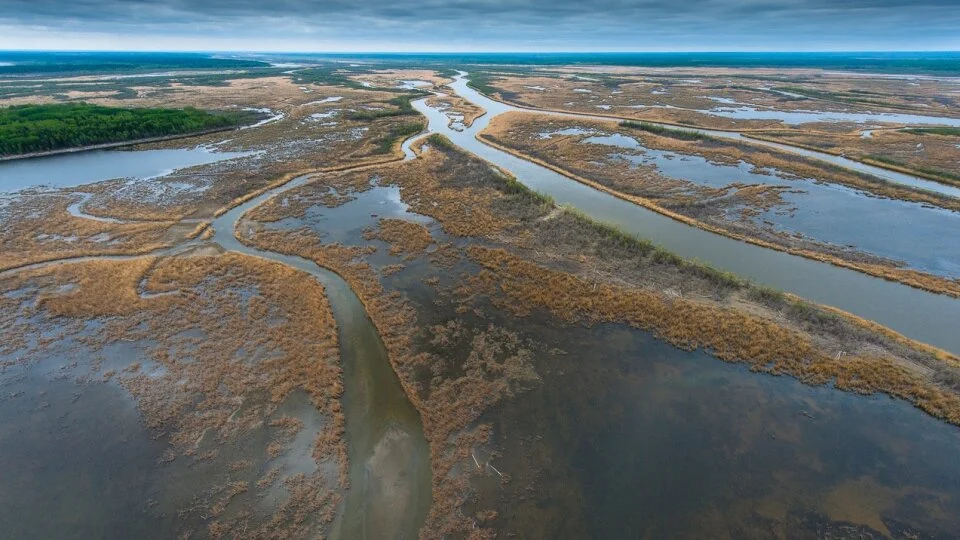A University of Alberta researcher is receiving $1.4 million over seven years to support the creation of a circular water system. "Eventually we're going to have to be very careful with our water," Mohamed Gamal El-Din told CBC's Radio Active, after being named Canada Research Chair in sustainable and resilient wastewater treatment for reuse. He is one of 12 scholars at the U of A receiving the academic honour to advance their work for a greener future.
How wildfires can have a devastating, long-term impact on nearby water supplies
Some researchers thought her team wouldn't even be able to detect an impact from the fires because the Athabasca River was already looking like tea before the fires. Heavy rains tend to send hot fudge-looking runoff from the land into the river, making it look like chocolate milk, she said. Arriving after the fires, Emelko said she could see that hot fudge-looking flow enter the Athabasca's waters as ash, likely carrying nutrients like phosphorous and carbon, made the water supply challenging for treatment processes. "Those [workers] were living in the water treatment plant, working hard to make sure that people could return to their homes and at least have safe water to drink," Emelko told Day 6 host Brent Bambury.
What a dry winter in the Rockies could mean for the spring
Snow-wise, it hasn't been a great year in the Rocky Mountains, says Canmore-based water expert John Pomeroy. "[The snowpack] is in the lowest quarter to lowest 10 per cent of all years measured over the last half century in the Kananaskis-Banff region," said Pomeroy, who is Canada Research Chair in Water Resources and Climate Change at the University of Saskatchewan. "It's definitely a low snow year."
UWindsor receives $1.77M to join largest freshwater research network in Canada
The University of Windsor is receiving more than $1.77 million in funding to support its leadership in the Real-Time Aquatic Ecosystem Observation Network (RAEON). It's working with eight other schools in the largest freshwater observational research network in Canada, and one of the largest globally. Aaron Fisk is the Canada Research Chair in Changing Great Lakes Ecosystems and a professor at the School of the Environment at the University of Windsor.
Nipissing professor receives prestigious role
Colin McCarter has been named Canada Research Chair in Climate and Environmental Change and the recipient of $600,000 in funding. McCarter is an assistant professor cross-appointed in the Department of Geography and the Department of Biology and Chemistry in the Faculty of Arts and Science at Nipissing University. The Honourable François-Philippe Champagne, Minister of Innovation, Science and Industry, announced an investment of more than $139 million to support 176 new and renewed Canada Research Chairs across Canada.
Two U of L researchers appointed to Canada Research Chair for water and agriculture
Two University of Lethbridge researchers have been appointed to the Canada Research Chair to help with their expertise in water and agriculture. Dr. Jean-Denys Hamel and Dr. Steve Wiseman were both appointed by the Honourable François-Philippe Champagne, Minister of Innovation, Science, and Industry Wednesday. Dr. Hamel, an assistant professor in the Department of Chemistry & Biochemistry, has been appointed a Tier 2 Canada Research Chair in Organofluorine Chemistry and Catalysis.
World Wetlands Day focused on improving awareness, protection for Sask. ecosystems
Experts are hoping World Wetlands Day gets people interested in protecting the shrinking ecosystems in Canada’s wetlands. Wetlands, both temporary and permanent, serve as a natural filter for larger bodies of water, replenish renewable water resources and serve as a home to many species. "The wetlands do all these things and it's pretty easy to forget that," said Peter Leavitt, Canada Research Chair. Jeff Olson, managing director at Citizens Environmental Alliance, said it is important to remember all the good these areas do, but to also mourn the ones we have lost.
Sask.'s $4B irrigation plan must address changing climate, Indigenous rights: professor
The Saskatchewan government has announced a $4-billion plan to expand irrigation out of the Lake Diefenbaker reservoir. Work is set to begin immediately, and will be completed in three phases over the next decade. CBC reporter Jason Warick spoke Friday with John Pomeroy, a Canada Research chair and director of the University of Saskatchewan's Global Water Futures program.









